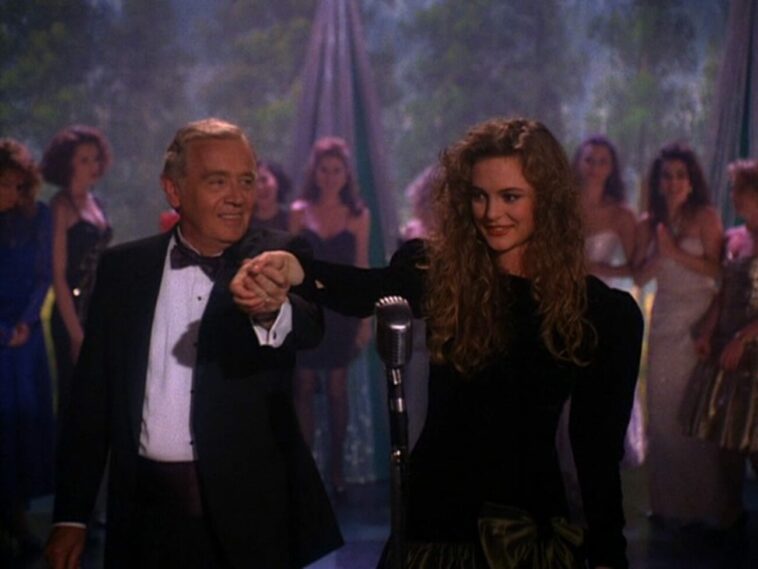Welcome, dear reader, as we continue our Original Series Rewatch of Twin Peaks with a review and analysis of Episode 28, aka S2E21, aka “The Night of Decision” (German title), aka “Miss Twin Peaks” (US fan title). Once again, this episode sees Twin Peaks return from a long hiatus, this time an excruciating seven-and-a-half weeks (April 18 to June 10, 1991). In that interim period, there was the release of My Life, My Tapes in May and the Access Guide in June, just ahead of the finale. While those books illuminated the history of Dale Cooper and the town of Twin Peaks, respectively, they did not provide the answers we had been dying to know for two months.
Tim Hunter, director of Episode 4 and the pivotal Episode 16, returned to helm this penultimate episode. In a 2018 interview for the Danish film journal 16:9, Hunter said he saw himself as a designated hitter whose role was to make the story clear so that Lynch could come in and do something wild. He also describes how cynical and disillusioned everyone was on set, compared to his previous stints. Mark and David had been away for large swaths of Season 2. ABC was being rather obvious about how much they wanted to kill the show. The ladies were especially nonplussed about the “town bathing beauty” plot that would culminate with this episode. In the end, Hunter considers it “not a very good episode.”
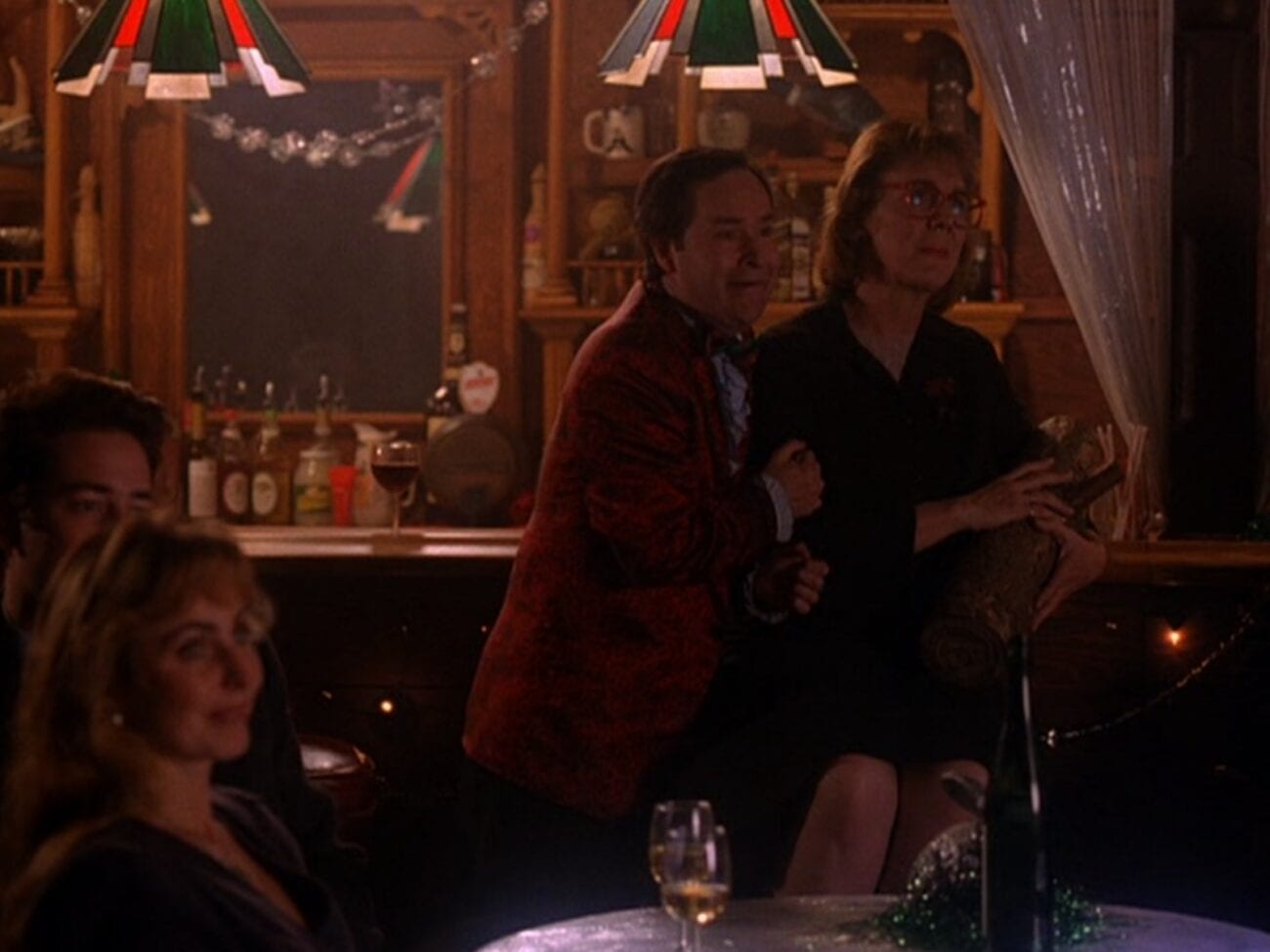
Log Lady Introduction
A log is a portion of a tree. At the end of a crosscut log—many of you know this—there are rings. Each ring represents one year in the life of the tree. How long it takes to grow a tree! I don’t mind telling you some things. Many things I…I mustn’t say. Just notice that my fireplace is boarded up. There will never be a fire there. On the mantelpiece, in that jar, are some of the ashes of my husband. My log hears things I cannot hear. But my log tells me about the sounds, about the new words. Even though it has stopped growing larger, my log is aware. – The Log Lady, Intro to Episode 28
This Log Lady intro dovetails nicely with Annie’s speech at the Miss Twin Peaks contest, where she quotes Chief Seattle of the Suquamish tribe. He explains how the forests still hold the spirits of their dead because they loved the land, just as the spirit of Margaret’s husband, who also loved the land, is held in this portion of a tree from the forest. The jar on her mantel may hold the ashes from his body, but her log preserves his spirit—no longer growing, but still aware.
In helping Annie prepare her speech, Cooper points out that trees are alive. Cutting them down for a development project like Ghostwood could be viewed as comparable to cutting down thousands of human lives. That would put the entirety of the Twin Peaks’ lumber industry in jeopardy! However, it should be noted that Sam Lanterman was a lumberjack, and Pete Martel worked as a foreman at the Packard Mill. I do not believe the intent is to view these two as bad men.
A building like the Great Northern Hotel can still be a spiritual place. It is styled as a lodge, full of wood lovingly carved by hand—a “white” lodge that respects and preserves the spirit of the forest. By contrast, Ghostwood Estates will mow down acres of forest and replace it with a “monstrous amusement park” full of cookie-cutter, manufactured homes, wreaking the same kind of destruction that fire can. Progress is the kind of fire that once started is very hard to put out.
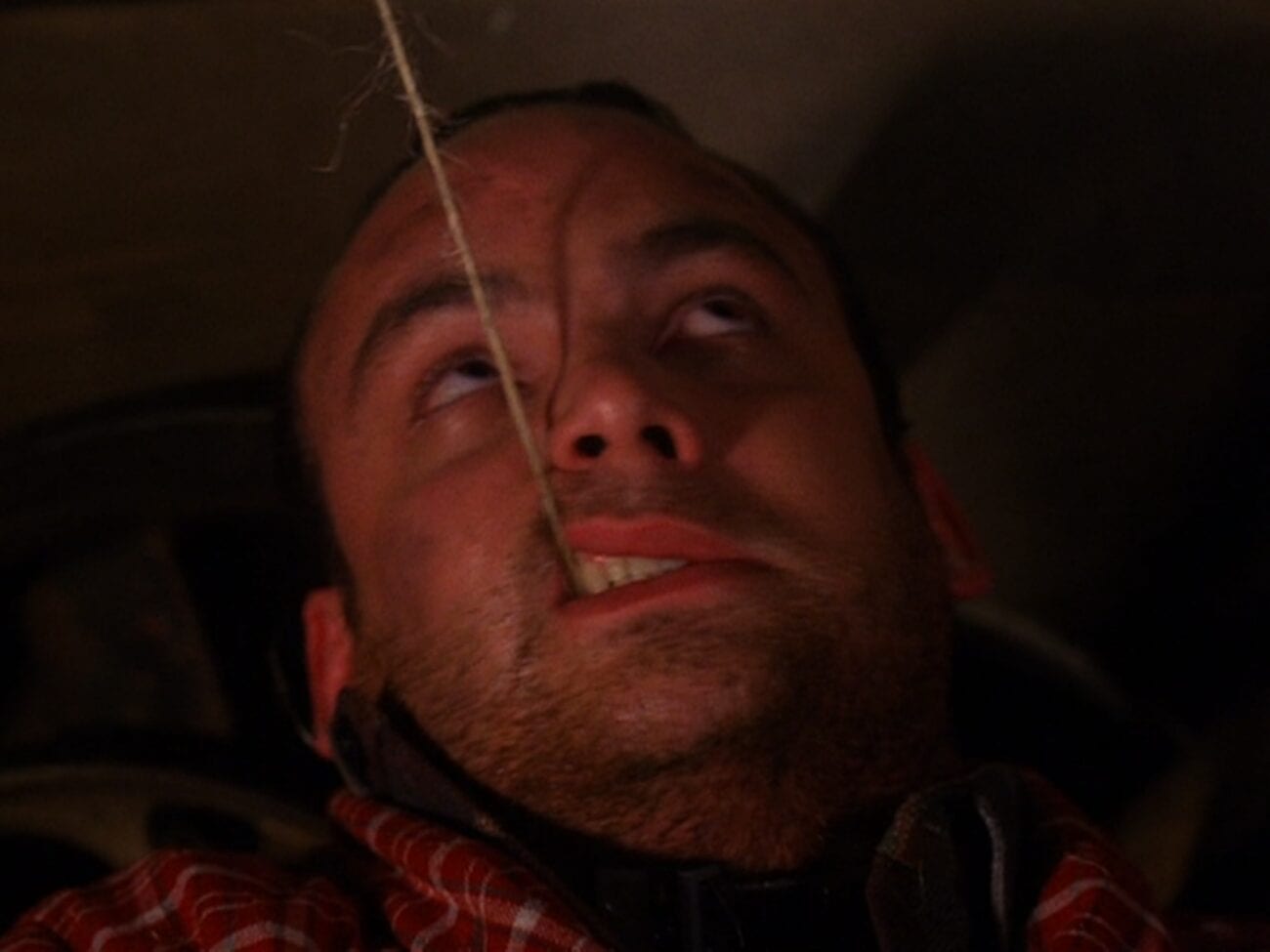
Leo Johnson
In my review of Episode 24, I likened Leo to the traditional family dog, obediently bringing the master his slippers, paper, and pipe. However, I see now that his relationship with Windom Earle is more like his relationship was with Shelly. Leo has become the abused domestic servant, cowering at the slightest flinch from the man of the house. Earle even calls Leo “dear one” as he says his final goodbye.
That changes in Episode 27 when he discovers Earle’s plans for Shelly, should she win the Miss Twin Peaks pageant. He attempts an ill-fated revolt, and now Earle’s left him shackled to the wall while he’s away. Indeed, Leo’s rekindled feelings toward Shelly continue to motivate him to free himself. While he might not be able to help himself (neither physically nor psychologically), he can help others. He frees Major Briggs and sends him off with a plea to “save Shelly.”
As Season 3 began to air, there was speculation that perhaps Leo would be one of the rumored unannounced cast members to return. After all, Shelly quite prominently had a wedding ring on a necklace. Perhaps Leo followed in Major Briggs’ footsteps and stumbled out of the woods himself—a reformed man after his experience with Windom Earle. Of course, that didn’t pan out in Season 3 and was then firmly squashed with the release of The Final Dossier. If Leo did fix his heart before he died, that knowledge went to the grave with him.
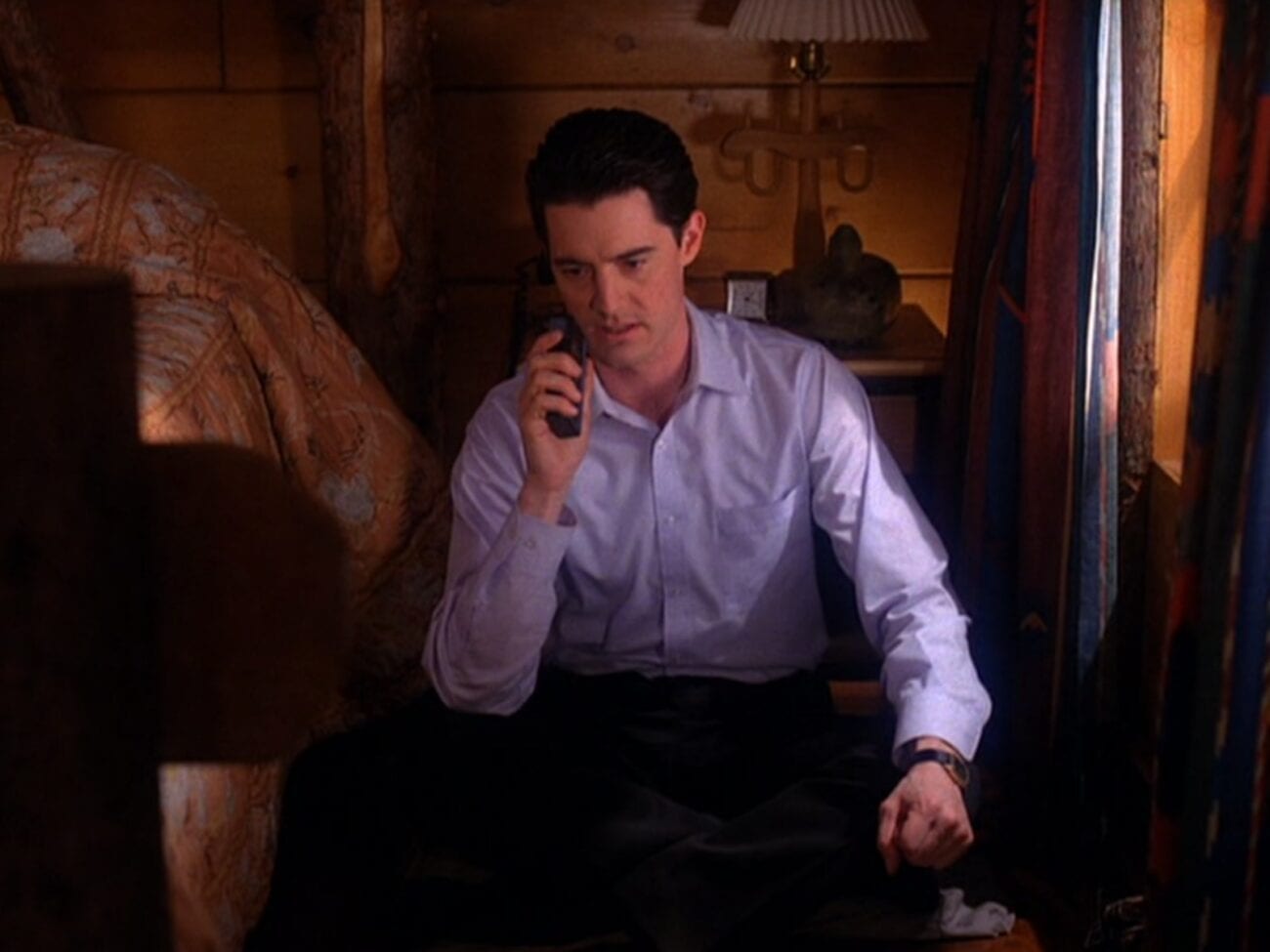
Agent Cooper
This episode is also the last time we hear Cooper say “Diane…” into his voice recorder. We get one “Diane…” moment in Episode 25 after Cooper thankfully ditches the plaid, and that’s the first mention of her since Episode 19. Here now in Episode 28, Cooper tells her:
Diane, it’s 1:17 p.m. I have just concluded my second meditation of the day in lieu of sleep. And I feel completely refreshed and struck again by the realization that all of us on this great big planet Earth live at only a fraction of our potential.
Anyone who practices meditation (like David Lynch) will tell you that meditation is not a replacement for sleep. Coop thinks he’s unlocking some hidden potential of his mind when in fact he’s just engaging in sleep deprivation. And, as he tells Diane in Episode 8:
A man can only go so long without submitting to a period of rest. For as we know from experiments conducted on American GIs during the Korean War, sleep deprivation is a one-way ticket to temporary psychosis.
That’s in the first episode of Season 2, and here we are at the penultimate episode, coming full circle. Did they plan this all along? I’d like to think so. Cooper is going into the final confrontation with Windom Earle and about to charge into the Black Lodge, sleep-deprived and potentially in a state of temporary psychosis. Not good.
Whatever his mental state, it seems to be helping him finally connect the dots. After Cooper figures out Andy’s 4-H Club reference, the expositional revelations just start flowing out of him like he’s in a Georgia coffee commercial. The conjunction is the “when.” There are two doors. There are two Lodges. Fear opens the door to the Black Lodge, love the other. When Harry questions Cooper what all of this means, Cooper replies, “It just came to me.”
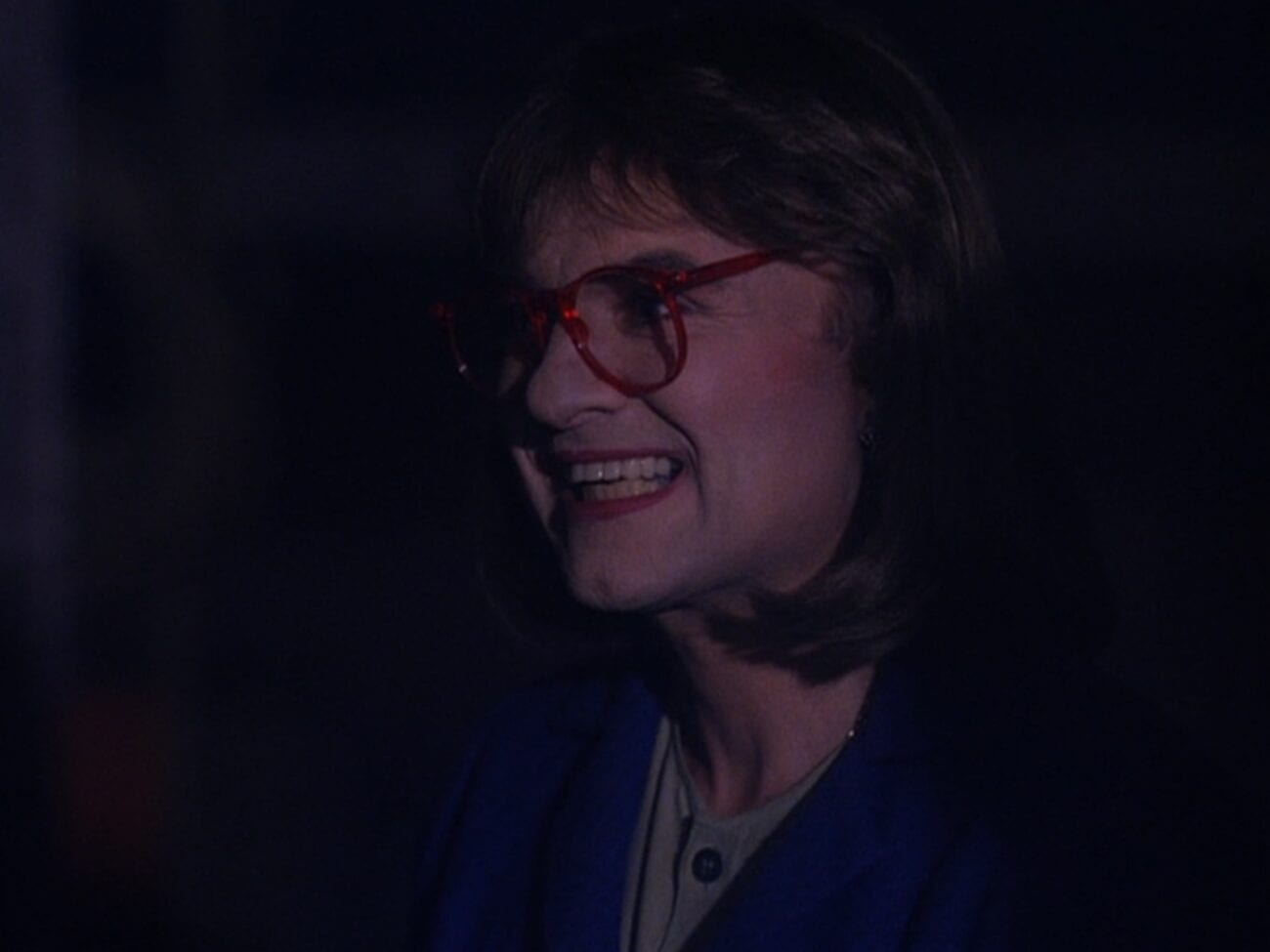
Windom Earle
We get our first hint that this finale (Episodes 28 and 29 combined, that is) is going to run off the rails when Earle returns to the cabin to find Major Briggs missing. He brandishes a bag full of “deadly spiders” (per the screenplay) at Leo and promises a new game rather than the usual shock-collar punishment. It’s menacing enough just coming from a “trifle miffed” Earle, but when he moves the bag away from his face—yikes! It’s an image as haunting as any appearance of BOB.
What does it mean? In the previously mentioned 16:9 interview, Tim Hunter explains that the black mouth is an homage to the minimalist films of Japanese director Yasujirō Ozu he had been watching at the time. There is a Japanese tradition of spiritual monsters called “Ohaguro bettari,” meaning “nothing but blackened teeth.” Ozu achieved the effect by blackening the mouth of his actors playing ghosts. As demonstrated here, it is quite striking.
Thus, the usual interpretation is that Earle is showing early signs here of transforming into an evil spirit, or at least letting evil spirits into himself, whether knowingly or unknowingly. This was just the kind of off-the-wall thing Lynch himself would throw in simply for the atheistic mood it generates. Indeed, Lynch would go on to use a similar effect for both Leland and Laura Palmer in Fire Walk with Me.
In the original Japanese tradition, an Ohaguro bettari is pictured as a geisha with no face except the blackened mouth. A quick Google image search will reveal some truly horrific results. What strikes me now, though, is how those images are the reverse of what we find under the mask of Sarah Palmer’s face when she takes it off in Season 3 Part 14. The Ohaguro bettari are white-faced with a black mouth. The creature behind Sarah’s face is black-faced with a white mouth. Kind of a negative image of the Japanese monsters. Was David Lynch inspired once again by Tim Hunter’s contribution, this time taking it in a slightly different direction? I think so.
For me, the most menacing image of Earle comes when he is at the Miss Twin Peaks pageant dressed as the Log Lady. First, there’s the explosive violence of Earle clubbing poor Bobby over the head with the log. Once the lights shut down, though—the entire time he’s running around on the stage in the strobe lights—he has this weird, grotesque, ear-to-ear grin on his face, the same kind of grin BOB always has when he is wreaking havoc. Again, in hindsight and with Season 3’s revelations, it is also very reminiscent of the grin on the monster’s face in Part 14.
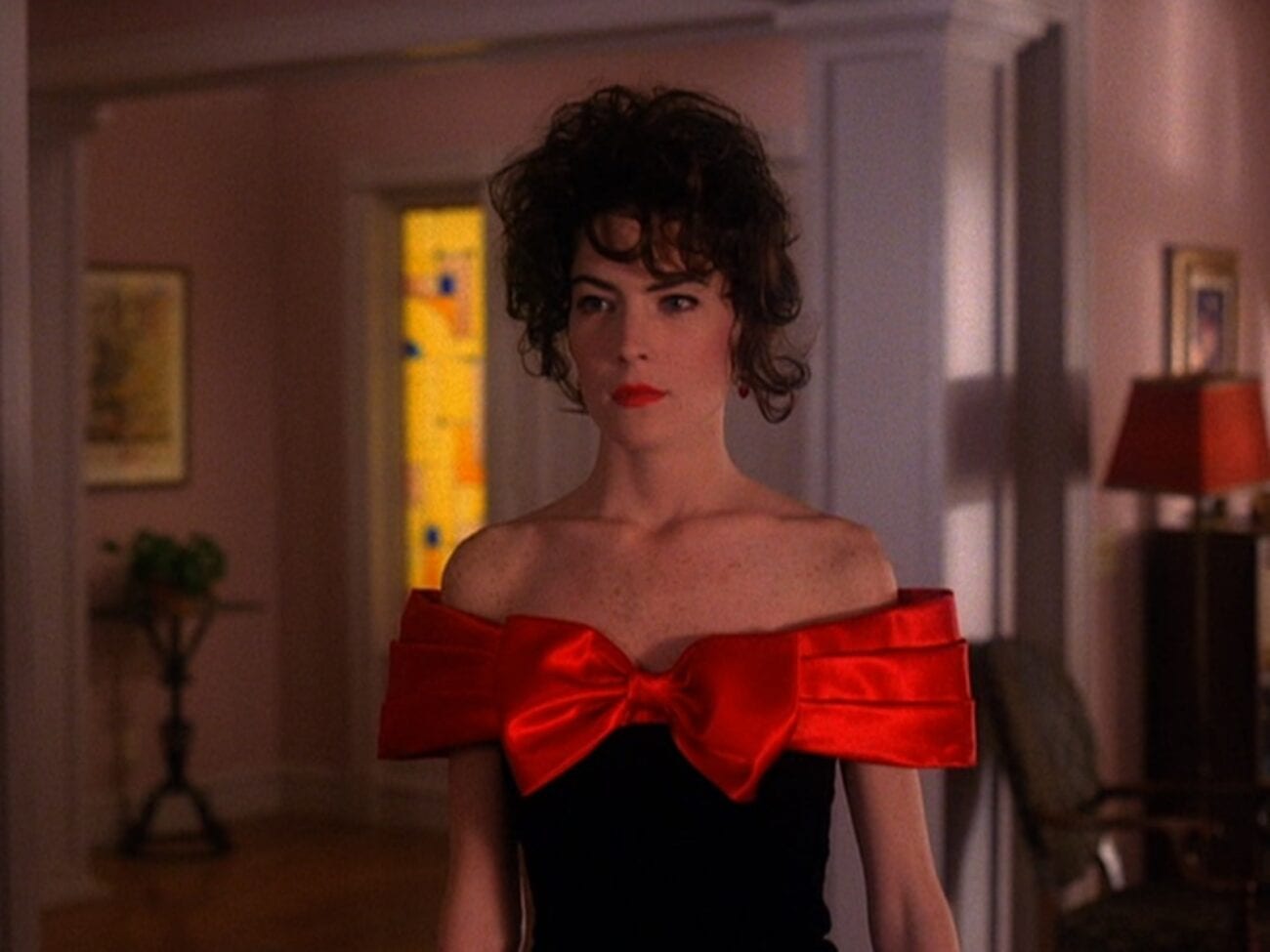
Donna Hayward
We all “know” that Ben Horne is Donna’s father, right? His is the missing name on her birth certificate. However, the show never says it outright. In fact, it seems to go out of its way to *not* say it. When Donna confronts her parents, Eileen says, “You’re young and you don’t know all the limitations.” Limitations? What in the world is that supposed to mean? When she confronts Ben, he also does not give her a straight answer. He wants to tell the truth. He wants to do the right thing. But he won’t…just…say it!
Even in Frost’s final novel, where he clears up so many of the dangling plot lines, it is never stated that Ben Horne is Donna’s father. Tammy Preston can see that something caused both the Hayward and the Horne families to splinter apart after the night of Cooper’s disappearance. She discovers Ben is funneling money to support Eileen after the breakup. Donna herself indicates that she cut ties with everyone in Twin Peaks with one exception, Audrey Horne. There are so many implications, but we are right there with Donna—no one will tell us the truth.
I personally always thought the big reveal between Ben Horne and Eileen Hayward would lead to an explanation of how she ended up in a wheelchair. That was such an obvious Chekhov’s Gun waiting to go off. The way they jink and jive around stating that Ben is Donna’s father, I always feel that, in the end, he will not turn out to be her father. It’s too obvious. Maybe it’s Jerry, and Ben is just covering up for him, as usual!
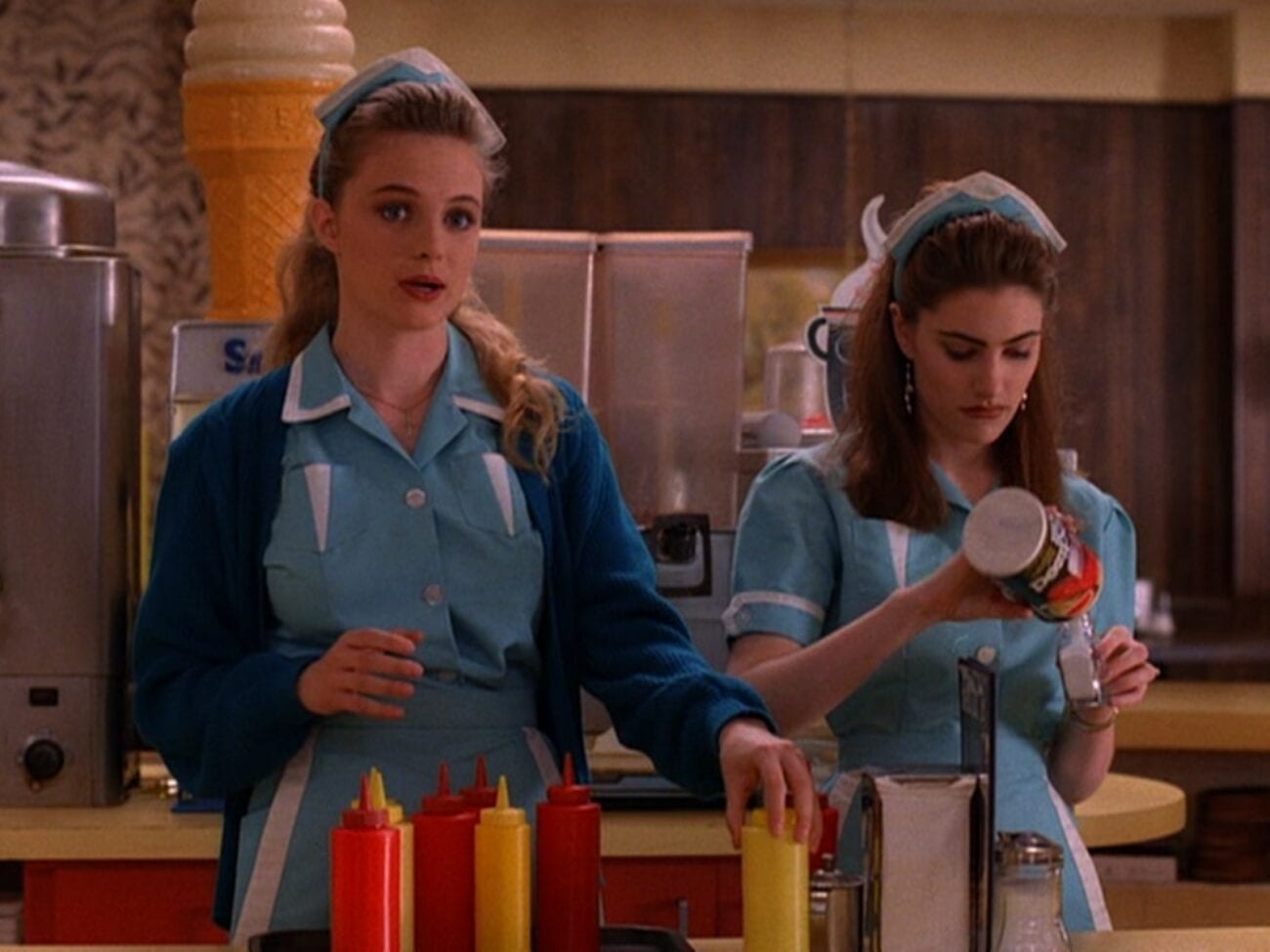
Miss Twin Peaks
Early on in this episode, Annie invokes the name of Laura Palmer for the first time in many, many episodes. As an outsider, that name does not carry the gravitas for her that it does for everyone else in town. Norma tells Annie and Shelly that this year’s Miss Twin Peaks is especially important this year. They need a new queen. Laura was their queen—the prom queen, that is—and something bad happened to her. Now a new queen will be crowned, Miss Twin Peaks, and something bad is going to happen to her, too.
In the final version of her speech, Annie acknowledges that before you love others, you have to love yourself. This is the truth that Ben Horne has been seeking all along. It’s not the Golden Rule, doing unto others. It’s doing unto yourself. Corruption starts within. When we learn to respect ourselves, we walk in respect for all of our lives. This is what Cooper hints at when he tells Harry, “Every day, once a day, give yourself a present.”
Dick Tremayne says, “Inherent in her message were words even the most craven of us can ill afford to ignore.” Dick is arguably the vainest man in Twin Peaks, but perhaps his contempt for others springs from contempt for himself. He is so excited by this idea that he can barely sit still through Lucy’s announcement of her “D-Day” decision. It’s not that he doesn’t care, he just cares more about casting his vote.
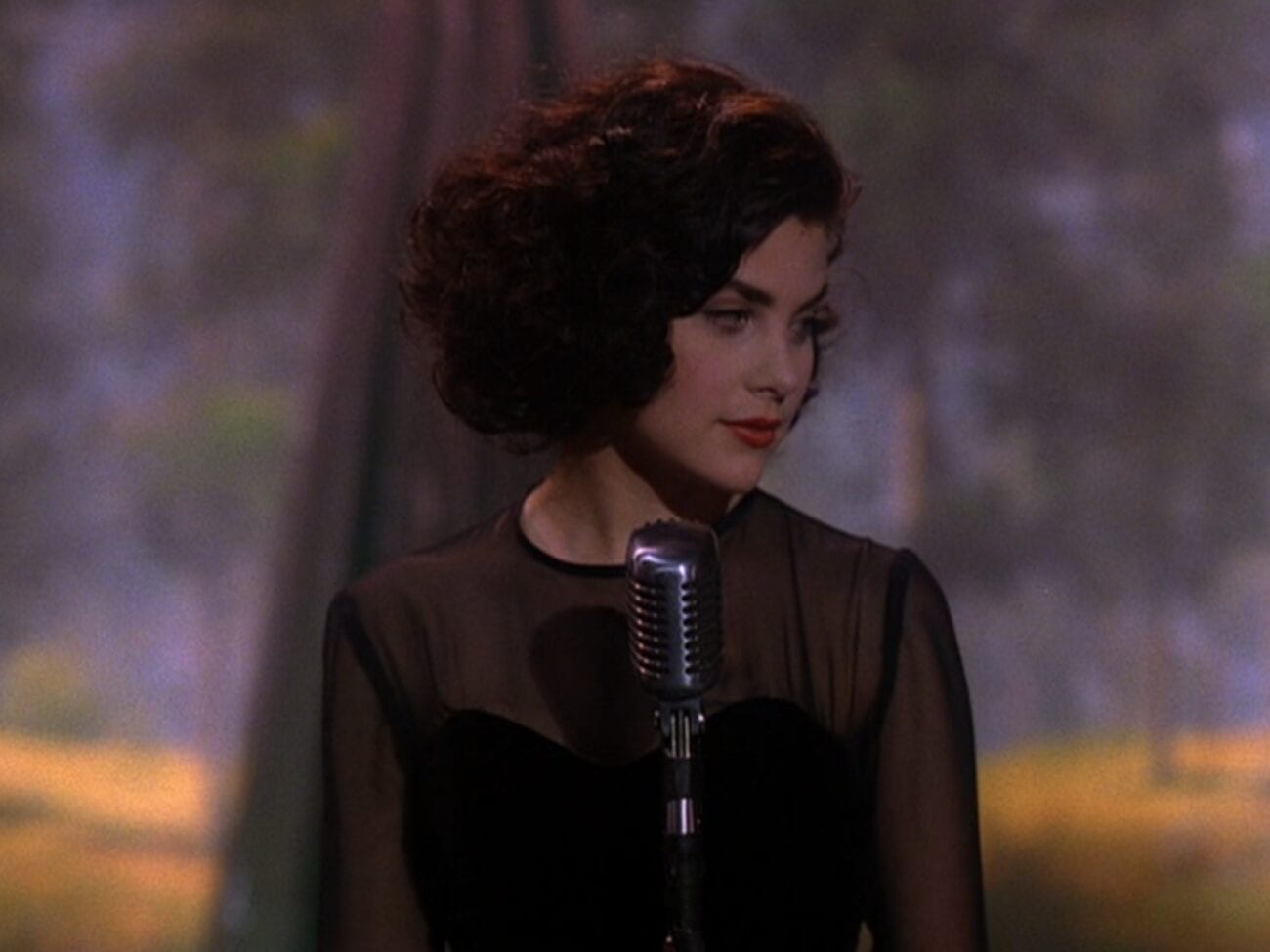
Quick Takes
- One wonders if the “deadly spider” store is right next to the costume store that Windom Earle has been shopping at all season long.
- Steven Miller of the Twin Peaks Blog does a community service of providing video and clips from the chaos at the end of the Miss Twin Peaks pageant with the strobe effect removed. One interesting thing he notes is that the shot of Windom Earle pushing the remote on smoke and firebombs is reversed.
- The chaos that the pageant descends into is the dark-mirror version of the pine weasel riot at the end of the fashion show of Episode 24.
- Pop Apostle points out that the Access Guide says the Miss Twin Peaks Pageant is held in April, even though in the series we are still in March. Granted, that’s one out of hundreds of tiny discrepancies between the book and the show.
- The Access Guide also implies the pageant is limited to girls between the ages of 16 and 18. In Episode 25, Earle said that one of the rewards of winning is a scholarship to the college of your choice.
- There is general agreement that the specific date of the Miss Twin Peaks pageant is March 26, 1989. In 1989, that was actually Easter Sunday. The host, Doc Hayward, starts out saying he hopes everyone had a good weekend, but in the screenplay, it’s “a good holiday.” This tells us that the writers were cognizant of the coincidence. Maybe it was even planned that way. The themes of death and resurrection would certainly be applicable.
- Mayor Milford is outraged that Annie won Miss Twin Peaks when she’s only been in town “about 15 minutes.” By that measure though, Lana, the runner-up, maybe clocks in at a half-hour at best. Perhaps the fact that these two newcomers to the series beat out the three established “queens” of Twin Peaks is indeed an outrage.
- Sherilyn Fenn seems to have been the most offended by the beauty pageant plans. In Reflections: An Oral History of Twin Peaks by Brad Dukes, she claims it was the only time she ever went to David and Mark and said “no.” She mostly got her way, but they did pressure her into at least giving the one speech on stage. You’ll notice that beyond that, Audrey is not present in any of the rehearsals nor in the final numbers. You can also see Lara Flynn Boyle and Mädchen Amick not taking things very seriously.
- One of the more fun bits in the original screenplay is this description of the contestants in their final pose after the opening number completes: “Audrey’s detachment, Shelly’s enjoyment, Donna’s preoccupation, Annie’s awkwardness, Lana’s sultriness, Lucy’s disorientation, Nadine’s hopefulness.”
- I would be remiss if I didn’t mention, as virtually all reviewers do, that all the girls are “wrapped in plastic” during the opening number with the raincoats and umbrellas.
- Nice parallels in this episode with Earle and Cooper finding the “key” to the Black Lodge, and the Packard siblings finding a physical key inside the final puzzle box.
- Though obviously filmed as standalone episodes, Episodes 28 and 29 were broadcast back-to-back as a two-hour series finale for “The ABC Monday Night Movie.”
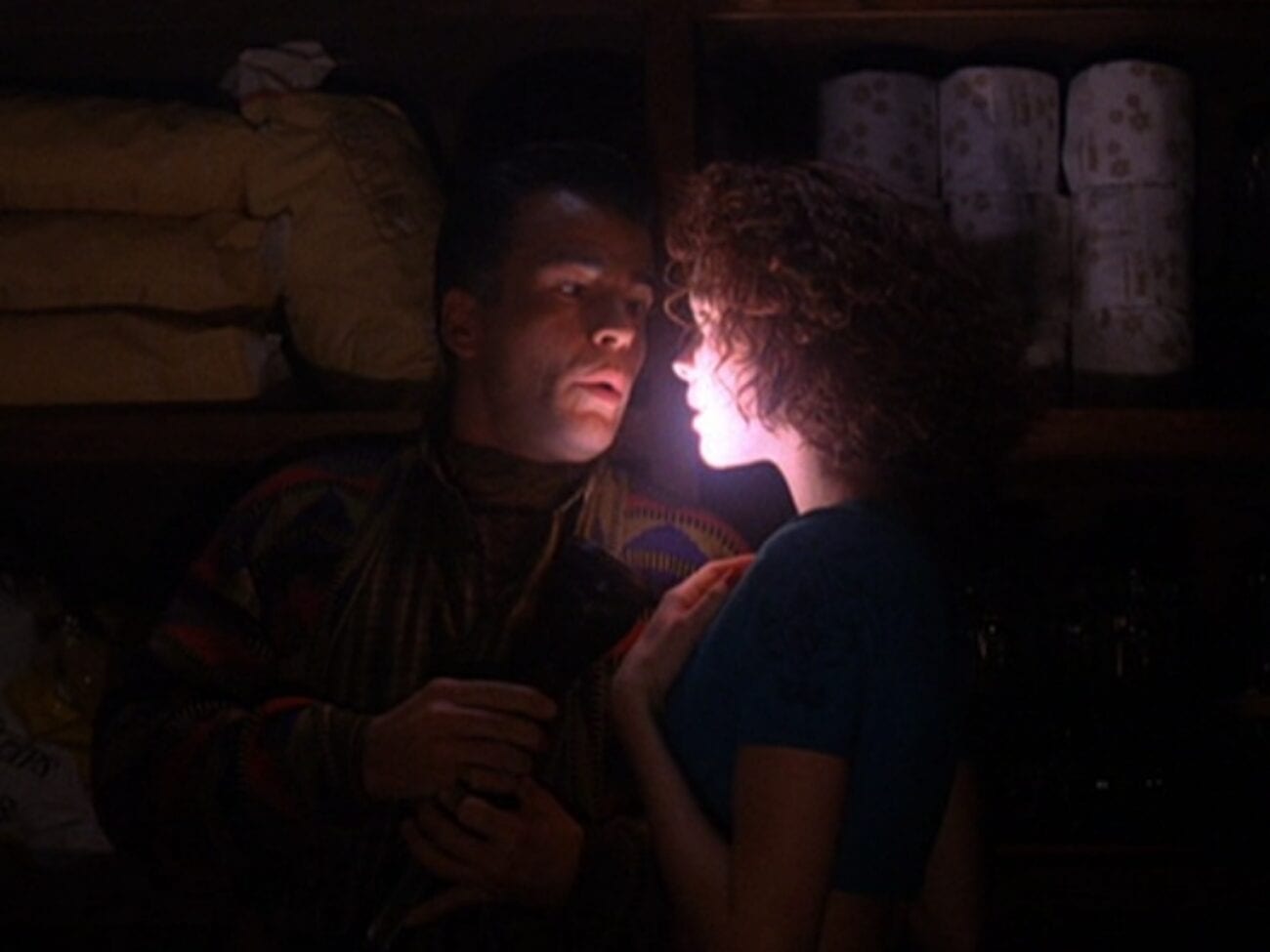
Best Lines
- “You make the rest of us look like primates.”
- “It’s the concentrate they make concentrate from.”
- “It would truly be inspirational to have a winner with a political sensibility that extends beyond makeup strategies and recipes for cherry pie, huh?”
- “I haven’t been this excited since I punctured Caroline’s aorta.”
- “Oh, by George, I think you’ve got it.”
- “I don’t wanna talk about trees anymore.”
- “Superior upper-body strength and quads like bridge supports.”
- “You just lost me.”
- “Let’s channel some of that high wit into the job.”
- “I can’t believe a little crumb like that can stand up to this Cram Jack all-duty vise.”
- “I’m so honored you made this decision. And I promise I’ll be a great father. But right now I’ve got to find Agent Cooper.”
- “This is an outrage! She’s been living in this town about 15 minutes.”

